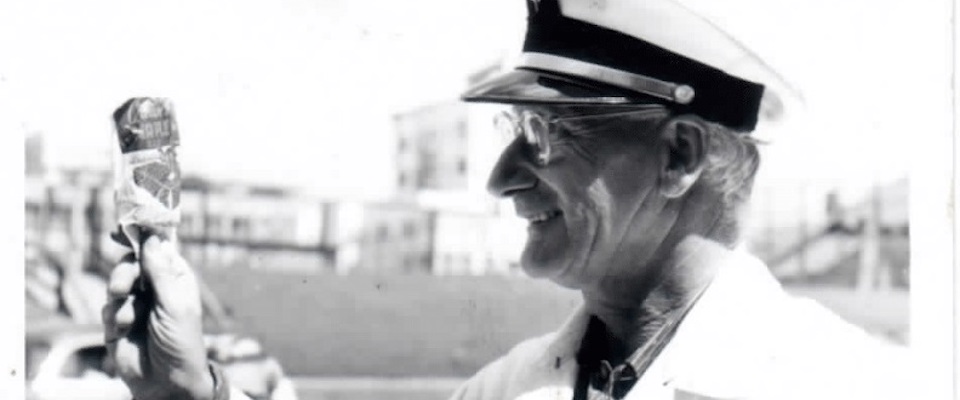During the 1950s and 1960s, there was a perpetually cheerful older gentleman who wore a white smock and cap while peddling ice cream on the Berkeley campus. He was known as the Crunchy Munchy Man and was a fixture on campus from 1952 to 1968. He often stationed himself outside Sather Gate, and his customers—the students of UC Berkeley—came, it seems, as much for the friendly service and engaging conversation as they did for the ice cream.
Or as the California Pelican put it in a profile of him, “He has become a real friend of the Cal student, vending his wares with both a smile and a bit of counsel on anything from philosophy to physics.”

I knew him as Alfred Dattner, my maternal grandmother’s father. I grew up hearing about him from my mom, his granddaughter, who mostly remembered him for his ice cream. As a kid, having a grandfather who sold ice cream was for her a fantasy come true, especially since visits always included a truck full of the stuff. (“You could have as much ice cream as you wanted?” I’d ask. “And he’d fill your freezer in the garage with ice cream before he left?!” I had a hard time comprehending unfettered access to an unimaginable quantity of the dessert.)
Later on, I asked my grandmother questions about him so I could get a better picture of what he was like. She said he was a kind person and good father, who tried to spend as much time with her as he could, especially after he and her mother divorced. She remembered him spending hours talking to her from below her bedroom window.
I didn’t even know about his other persona, until I spotted a collection of his stuff while helping clear out my grandparents’ house. When Alfred passed away in 1968 from heart failure, he left behind family pictures going back to the 1800s, a trail of paper work that filled in some of the blanks in his life, and artifacts from his 18 years as Crunchy Munchy Man, or California Al as he sometimes was known.
Crunchy Munchy Man was created when my great-grandfather was in his late 50s. He was an amalgamation of all the experiences and jobs Alfred had had up until then.

Born in Poland in 1893, he came to the U.S. as a young man, settling in Michigan and eventually becoming fluent in both written and spoken English. He had a series of odd jobs and careers, often working as a machinist (specifically, a lathe machine operator) and owning and operating a couple gas stations between the 1920s and early 1930s. He became a U.S. citizen in 1928 when he was 35 and his daughter, my grandmother, was 2 years old.
In midst of the Great Depression in the 1930s, he went back to being a machinist. Sometime between then and WWII, he got divorced and became a government inspector for the Department of War in Michigan.
In the late 1940s with my grandmother grown and in college, he headed out west to the Bay Area. My grandfather met him for the first time when he was stationed in San Francisco en route to Korea during the Korean War. He wrote about that meeting in a letter to my grandmother, describing his father-in-law as an enthusiastic, jolly person who was easily excitable. He also noted that Alfred was currently working as a barker in San Francisco, where he learned skills that he would directly employ as Crunchy Munchy Man.
He was used to reinventing himself. He had left Poland for the U.S., gone from being a machinist to a gas station owner/operator and on to charming salesman. In Crunchy Munchy Man he found his longest and best fitting career and persona: ice cream salesman who befriends fraternity members, proudly places third place in an Ugly Man Contest held on campus, and uses rhyme to sell his goods (“Crunchy Munchy, Eat them after lunchy. You should, they’re good.”).

The Daily Californian described him in an article from their May 17, 1965 edition. “Crunchy knows he has a role to play: the carefree spunky little man with a bright word for everybody and he plays his role well. So well, in fact, that his fan club at Kappa Nu fraternity, gave him a semi-lavish birthday party three years ago, when he was 69, and has declared, on an official rolled-declaration that Saturday, May 15 is Crunchy Munchy Day.”
The trophy he received at that birthday party now sits on top of my tea cabinet. And almost 50 years after he died, he is still remembered as a colorful Berkeley character.
“I made the time to spend the entire day with Alf,” said William “Bill” Stricklin, a lawyer who graduated from UC Berkeley in 1959. The day began early in the morning when the two walked to the neighbor’s garage where the ice cream bars were stashed, and where they’d return many times during the course of the day to get replacements.
“His big smile and enthusiastic love of people translated to a big clientele who dearly loved to buy from him,”Stricklin added. “He was one of the kindest individuals I have ever known.”



















